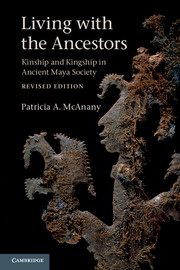Book contents
- Frontmatter
- Dedication
- Contents
- Figures and Table
- Preface
- Living with the Ancestors: Kinship and Kingship in Ancient Maya Society
- Introduction to the Revised Edition
- ONE A Point of Departure
- TWO Ancestor Veneration and Lineage Organization in the Maya Region
- THREE Creating a Genealogy of Place
- FOUR Lineage as a Crucible of Inequality
- FIVE Kin Groups and Divine Kingship in Lowland Maya Society
- SIX Ancestors and Archaeology of Place
- POSTSCRIPT The Future of the Ancestors and the Clash between Science and Human Rights
- Notes
- References Cited
- Index
SIX - Ancestors and Archaeology of Place
Published online by Cambridge University Press: 05 July 2014
- Frontmatter
- Dedication
- Contents
- Figures and Table
- Preface
- Living with the Ancestors: Kinship and Kingship in Ancient Maya Society
- Introduction to the Revised Edition
- ONE A Point of Departure
- TWO Ancestor Veneration and Lineage Organization in the Maya Region
- THREE Creating a Genealogy of Place
- FOUR Lineage as a Crucible of Inequality
- FIVE Kin Groups and Divine Kingship in Lowland Maya Society
- SIX Ancestors and Archaeology of Place
- POSTSCRIPT The Future of the Ancestors and the Clash between Science and Human Rights
- Notes
- References Cited
- Index
Summary
Godelier (1986) has referred to the false dichotomy between the mental and the material—between the “superstructure” and the “infrastructure.” To my mind, a similar and false polarization has characterized ancient Maya studies. More than a matter of scholarly perspectives, however, these “polar” entities have been linked to social segments; the mental—the ideological—has been linked with the study of all things “elite,” and the material with all things construed to have been “nonelite.” This construct is not only inaccurate, it is denigrating. The dawn of the twenty-first century (in the Gregorian calendar) and the imminent end of a long-count cycle (A.D. 2012) in the Maya calendar provide an auspicious opportunity to move beyond the ecological/ideological dichotomy to a new fusion of settlement and epigraphic research; this study is one effort at such a new kind of synthesis.
In current ethnographic research, many investigators have abandoned the “voice” of authority as we know it from traditional ethnographies and attempt to present their research giving full voice to interviewed participants. I suggest a similar course for Maya studies—an abandonment of the unitary “top-down” approach and a concomitant broadening of the “playing field” to include nonstatist organizational structures in our models of Maya political power and economic organization.
Ostensibly, this book is about Maya society and the historical processes that shaped this society. Rather than introduce more complexity into a book that is already unusually concept-laden for this area of study, I refrain from expanding my frame of reference to general Mesoamerica. Readers familiar with Mesoamerica west of the isthmus or south of the Sula River, however, will recognize the wide reach of issues discussed in this book—lineage, land, the domestic focus of ancestor veneration, inequality, and the oppositional nature of kinship and kingship. There is a historical specificity here that is distinctly Maya, but the broad issues can be broached for many parts of Mesoamerica.
- Type
- Chapter
- Information
- Living with the AncestorsKinship and Kingship in Ancient Maya Society, pp. 157 - 166Publisher: Cambridge University PressPrint publication year: 2014



